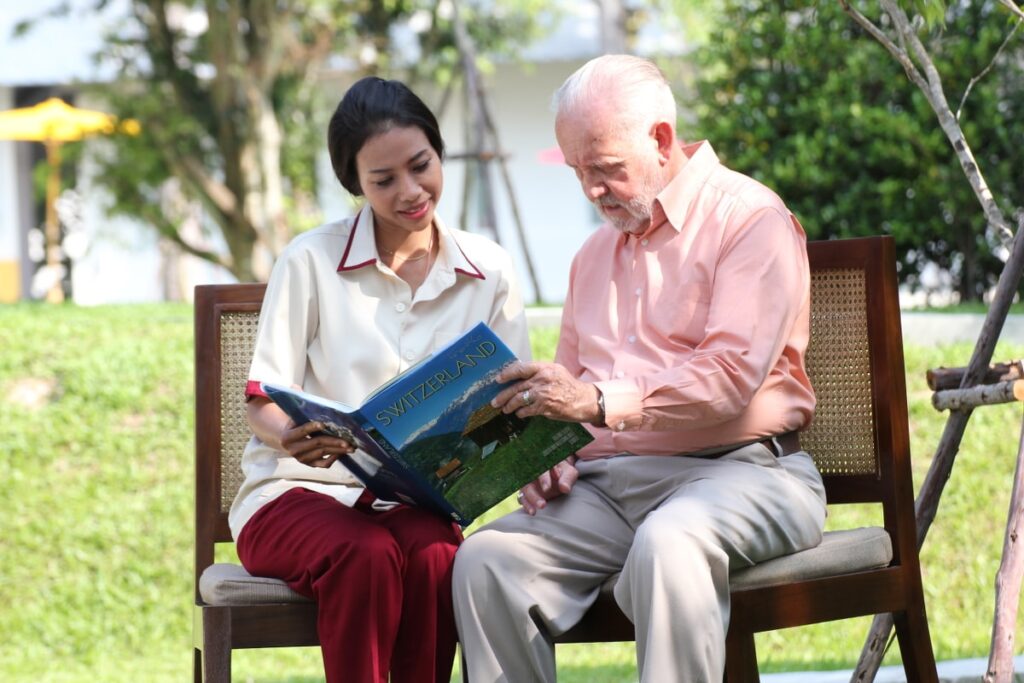Introduction:
The global demographic landscape is rapidly evolving, with an increasing proportion of older adults. With this shift comes an urgent need to address the challenges of ageing, particularly the growing prevalence of frailty among older adults in aged care facilities. Frailty, characterised by diminished physiological reserves and increased vulnerability to stressors, significantly impacts quality of life, healthcare utilisation, and healthcare costs. Additionally, falls pose a substantial risk and contribute to adverse outcomes in this population. Addressing these issues necessitates comprehensive nursing care.

This project aims to bridge critical knowledge gaps by investigating a comprehensive and collaborative intervention approach involving government agencies, not-for-profit aged care providers, allied health professionals, and nursing care teams. By exploring the combined effects of physical activity, nutritional support, cognitive training, social engagement, falls prevention strategies, and specialised nursing care, this research seeks to contribute to a transformative shift in aged care practices and policies.
Knowledge Gaps:
While substantial research has examined individual interventions to address frailty, promote healthy ageing, prevent falls, and provide nursing care, limited studies have investigated the synergistic effects of a multidimensional approach within a collaborative framework. The knowledge gaps lie in understanding the potential benefits of integrating physical, cognitive, nutritional, and social interventions, alongside falls prevention strategies and specialised nursing care, as well as the practicality and sustainability of such an approach when implemented through collaborative partnerships.
Rationale:
Frailty poses a significant challenge to older adults’ well-being and healthcare systems globally. Traditional approaches to frailty reduction, falls prevention, nursing care, and healthy ageing have predominantly focused on isolated interventions, often failing to address the complexity of the ageing process comprehensively. The rationale for this project stems from the need to move beyond singular interventions and embrace a comprehensive, person-centred strategy that aligns with the multidimensional nature of ageing. By engaging collaborative partnerships, this research seeks to develop and implement an intervention model that not only addresses frailty, promotes healthy ageing, and enhances falls prevention but also integrates specialised nursing care to optimise residents’ overall quality of life.
Significance of Proposed Research:
The proposed research holds immense significance on multiple fronts. Firstly, it addresses critical knowledge gaps by investigating the synergistic impact of multifaceted interventions within the aged care context. This knowledge can inform the design of evidence-based interventions tailored to the specific needs of older adults, potentially revolutionising care practices.
Secondly, the collaborative approach involving government agencies, not-for-profit aged care providers, allied health professionals, and nursing care teams signifies a novel direction in aged care research. By uniting diverse stakeholders, the research aims to bridge the gap between research and practice, ensuring that interventions are both feasible and sustainable in real-world settings.
Furthermore, the outcomes of this research have the potential to influence policy decisions, resource allocation, and funding priorities within the aged care sector. By demonstrating the value of collaborative, multidimensional interventions that integrate specialised nursing care, the findings could shape the direction of future aged care policies, enhancing the overall well-being of older adults and reducing healthcare costs associated with frailty-related complications, falls, and nursing care needs.
In conclusion, this project seeks to fill critical knowledge gaps, address current shortcomings in aged care interventions, and promote a transformative shift towards comprehensive, collaborative approaches to healthy ageing, frailty reduction, falls prevention, and nursing care. Through rigorous research and innovative partnerships, the project aims to contribute to the betterment of aged care practices, policies, and, most importantly, the lives of older adults in aged care facilities.
Interventions for Healthy Ageing and Frailty Reduction:
Physical activity interventions have demonstrated substantial benefits in maintaining or improving muscle strength, balance, and mobility among older adults (Cadore et al., 2013). Additionally, nutritional interventions focused on adequate protein intake and supplementation have shown potential in enhancing muscle function and reducing frailty risk (Milan et al., 2020). Cognitive training and social engagement activities contribute to cognitive vitality and emotional well-being, key aspects of healthy ageing (Mowszowski et al., 2020). However, a gap exists in integrating these interventions holistically and effectively.
Falls Prevention Strategies:
Falls are a leading cause of morbidity and mortality among aged care residents. Multifactorial falls prevention approaches, including balance training, environmental modifications, and medication reviews, have proven effective in reducing falls risk (Hill et al., 2019). Collaborative efforts involving healthcare professionals, nursing staff, and residents are crucial to implementing and sustaining these interventions.
Importance of Nursing Care:
Nursing care plays a pivotal role in providing holistic care to aged care residents. Person-centred nursing approaches have been associated with improved physical and psychological well-being, highlighting the significance of tailored care plans (Anderson et al., 2020). Collaborative partnerships between nursing teams, allied health professionals, and external stakeholders enhance the delivery of comprehensive care and interventions.
Collaborative Approaches to Aged Care Interventions:
Collaboration between government agencies, not-for-profit aged care providers, allied health professionals, and nursing teams is essential to achieving comprehensive interventions. Government support through funding allocation and policy endorsement enhances the feasibility and scalability of interventions (Sands et al., 2020). Not-for-profit providers contribute specialised knowledge and a person-centred approach that aligns with residents’ unique needs (Gaugler et al., 2014). The involvement of allied health professionals ensures targeted interventions addressing specific dimensions of ageing, frailty, and falls prevention (Schoene et al., 2018).
Bridging the Gap:
While individual interventions targeting healthy ageing, frailty reduction, falls prevention, and nursing care have shown promise, a significant knowledge gap exists in understanding the combined impact of these interventions within a collaborative framework. Few studies have examined the synergistic effects of physical, cognitive, nutritional, and social interventions, along with specialised nursing care, on older adults’ overall well-being in aged care settings. The practicality, feasibility, and sustainability of such integrated approaches remain understudied.
Significance of Collaborative Interventions:
Collaborative interventions offer a promising avenue for enhancing the care of older adults in aged care facilities. Integrating multifaceted interventions and specialised nursing care has the potential to address the complex challenges of frailty, falls, and overall well-being more effectively than isolated approaches. The significance of this research lies in its potential to inform aged care practices, policies, and resource allocation.
Conclusion:
This literature review underscores the importance of collaborative interventions involving government agencies, not-for-profit aged care providers, allied health professionals, and nursing care teams in promoting healthy ageing, reducing frailty, preventing falls, and enhancing the overall well-being of older adults in aged care facilities. By exploring the combined effects of comprehensive interventions within a collaborative framework, this research proposal aims to bridge knowledge gaps and contribute to a transformative shift in aged care practices and policies. Through rigorous research and innovative partnerships, the project aspires to improve the quality of life and care for older adults, ultimately making a positive impact on the aged care landscape.
References:
Anderson, R. A., Toles, M., Corazzini, K., & McDaniel, R. R. (2020). An Integrative Review of Person-Centered Care Intervention Studies in Long-Term Care. The Gerontologist, 60(1), e67-e78.
Cadore, E. L., Rodríguez-Mañas, L., Sinclair, A., & Izquierdo, M. (2013). Effects of different exercise interventions on risk of falls, gait ability, and balance in physically frail older adults: a systematic review. Rejuvenation Research, 16(2), 105-114.
Gaugler, J. E., Kane, R. L., Kane, R. A., Newcomer, R., & Clay, T. (2014). Caregiving and Institutionalization of Cognitively Impaired Older People: Utilizing Dynamic Predictors of Change. The Gerontologist, 54(1), 23-34.
Hill, A. M., McPhail, S. M., Waldron, N., Etherton-Beer, C., Ingram, K., Flicker, L., & Haines, T. P. (2019). Fall rates in hospital rehabilitation units after individualised patient and staff education programmes: a pragmatic, stepped-wedge, cluster-randomised controlled trial. The Lancet, 393(10181), 342-353.
Milan, A. M., Pundir, J., Steeves, R., Gokal, K., Tadros, S., & Cheema, C. (2020). Protein Supplementation for Community-Dwelling Older Adults: A Systematic Review and Meta-analysis. JAMDA, 21(1), 11-19.
Mowszowski, L., Lampit, A., Walton, C. C., Naismith, S. L., & Cognitive Training Research Group. (2020). Strategy-Based Cognitive Training for Improving Executive Functions in Older Adults: A Systematic Review. Neuropsychology Review, 30(4), 531-554.
Sands, L. P., Lim, E., Tseng, C. H., Zhou, H., & Trivedi, A. N. (2020). Partnerships Between Aged Care Organizations and Hospitals: Lessons From the U.S. and Australia. JAMDA, 21(4), 454-458.
Schoene, D., Valenzuela, T., Toson, B., Delbaere, K., Severino, C., Garcia, J., … & Lord, S. R. (2018). Interactive cognitive-motor step training improves cognitive risk factors of falling in older adults—a randomized controlled trial. PloS one, 13(10), e0205524.


